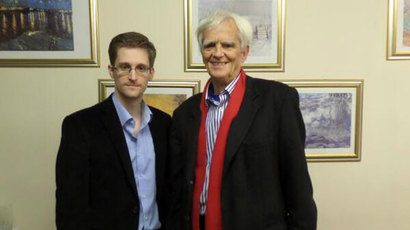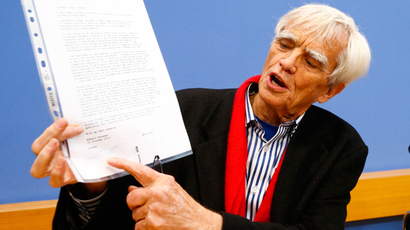Germany considers questioning Snowden in Moscow, won't grant him asylum

The German Ministry of Internal Affairs is contemplating questioning Edward Snowden in Moscow over the ongoing US spying scandal. Germany believes its transatlantic alliance with the US could be harmed if it were to offer asylum to the whistleblower.
The possibility of interviewing Snowden in Russia does exist, interior ministry spokesman Jens Teschke said on Monday, as another official voiced simultaneous concern over the German-US relationship.
“This is also about our security and our interests as partners. For us Germans, the transatlantic alliance remains of paramount importance,” official spokesman of the cabinet, Steffen Seibert, said on Monday.
"There is hardly a country that has profited as much from this partnership and friendship as Germany [as the US]... and this will guide the [German] Chancellor [Angela Merkel] in all future decisions.”
While the German government has publically expressed distaste for US surveillance actions, in a country where intrusive government spying is still a sore issue, the statements display clear evidence that Germany’s relationship with the US is still considered a key priority for the German government.
Towards the end of October, German Chancellor Angela Merkel - whose phone had been reportedly bugged by American digital spies - warned that European countries’ relations with the US have been “severely shaken” by the developing scandal and that “trust needs to be rebuilt.”
“The United States of America and Europe face common challenges. We are allies. But such an alliance can only be built on trust,” she said. “That's why I repeat again: spying among friends – it cannot be.”
A recent appeal from over 50 senior German officials to grant Snowden asylum in Germany has been mired in simultaneous concern over the potential German complicity in US surveillance that excessive probing may uncover.
“This is something perhaps that the current German government would not support – perhaps suggesting that some of the skeletons in their own closet could come out if there was any big investigation into just exactly what had gone on in terms of the NSA spying program,” RT’s Peter Oliver said from Berlin.
Snowden already met with German Greens lawmaker Hans-Christian Stroebele in Moscow on Thursday. Stroebele wants to escort the American whistleblower to Germany so that he can testify before an investigative committee of the German parliament, the Bundestag, and in doing so provide him with a secured right of residence in Germany, according to German magazine Der Spiegel.
The barrage of calls for Germany to eventually grant Snowden asylum grew on Monday when a group of senior German officials wrote a joint appeal requesting that he be granted asylum. The appeal was published in Der Spiegel.
“Snowden has done the Western world a great service. It is now up to us to help him,” Heiner Geissler, former general secretary of Angela Merkel's Christian Democrats, wrote in the appeal.
Snowden further reached out to the international community over his willingness to continue to discuss the NSA leaks in the future.
“My government continues to treat dissent as defection, and seeks to criminalize political speech with felony charges that provide no defense,” Snowden wrote in an open letter published in the German press at the end of last week. It was merely entitled “to whom it may concern,” although some media outlets perceived it to be directed at Merkel.
“Speaking the truth is not a crime,” Snowden added.
Snowden’s lawyer, Anatoly Kucherena, said on Friday that any exchange of information between Germany and Snowden would have to occur on Russian soil, where he has been granted temporary asylum, according to an interview with Moscow-based broadcaster Echo Moskvy.
It would be possible for Snowden to give testimony in Russia “within the framework of international agreements,” said Kucherena.














